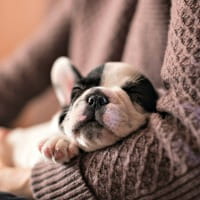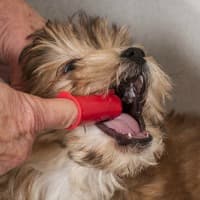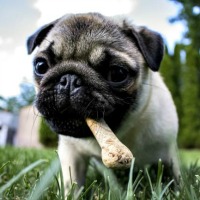FYI: If you buy something through a link on this site I may earn a commission - at NO extra cost to you.
Puppy Teething Help
Practical puppy teething help and advice can make this tricky stage easier on everyone.
There are several months of your puppy's development during which he will be losing his baby teeth and cutting adult ones.
This is called the 'puppy teething' phase.
Puppies usually have all of their 'baby' (aka 'deciduous' or 'milk' teeth) in place by the time they're about 8 weeks old.
They only have a full set of these tiny, razor-sharp teeth for about a month.
The teething stage usually starts at around the 12 - 14 week mark.
Sometimes a drop or smear of blood on a toy or bone is the first sign that you have a teething puppy. Some pups find teething uncomfortable, others don't even notice it's happening.
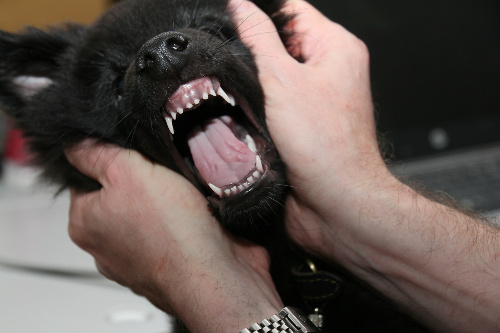
However YOU will probably notice as a teething puppy has a compulsion to chew on everything he can find.
The pressure that chewing puts on his gums helps Fido feel
better, and it also encourages his baby teeth to fall out, allowing the adult ones to grow in.
Chewing plays an important role in your pup's dental development.
How Can I Help My Teething Puppy?
We all know that a teething baby can be uncomfortable and cranky, and that soothing her gums and giving her the right kind of 'teething toys' can help make her feel better.
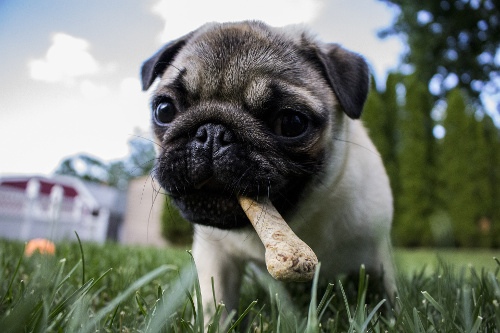
But did you know that it works in pretty much
the same way for puppies?
Now not ALL puppies get upset or distressed when they're teething.
Some will find this stage painful, but most of these seem to be uncomfortable more than in real pain - although the occasional pup may whimper or seem to be actually hurting.
But many puppies have few real problems.... and some seem totally oblivious!
You don't need to do
anything to 'help' the loose or wobbly puppy teeth to come out, so don't
fiddle with them.
What
you can do to help (and should do) is make sure your puppy has plenty of safe,
sturdy chew toys to play with.
These will help soothe his sore gums,
satisfy his urge to chew, and help protect your furniture, shoes and
home from his determined chewing efforts.
Of course, puppies are
perfectly happy to chew anything that comes anywhere near their mouths,
and often the forbidden items seem oh, so much more interesting than
the ones in his toy box.
So, during these months you're going to need to be extra vigilant about discouraging 'inappropriate' chewing habits or you could find that your home furnishings will take a beating!
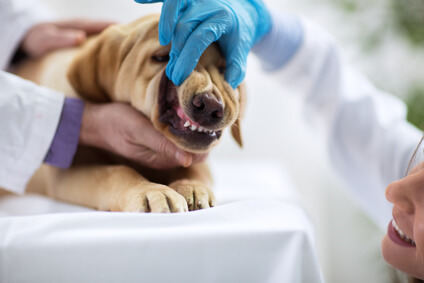
Although they will come through the puppy teething stage eventually - even without any assistance from their owners - most will benefit from a little extra puppy teething help.
Plus, if you want your home, furniture, hands, clothes (etc.) to be more or less intact at the end of this phase, you're going to need to be a little pro-active.
There are two main approaches to handling a teething puppy. The first is to give him the toys, treats and remedies he needs to soothe his gums and satisfy his urgent desire to chew and gnaw.
The second is to discourage him from sharpening his little teeth (or soothing his gums) on you or your possessions.
Puppy Teething Toys
There are all sorts of dog toys that have been especially designed to help with puppy teething, and can give him the satisfaction of some heavy-duty chewing and soothe his gums at the same time.
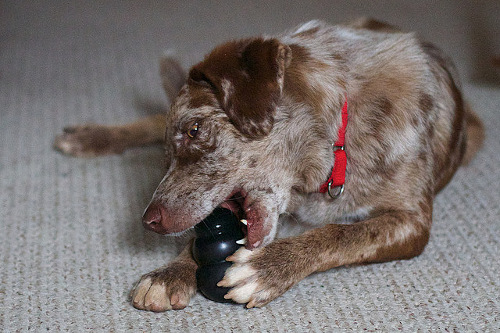
Good toys for teething puppies include:
- Durable rubber chew toys (eg Kong toys)
- Multi-surface toys which combine fabric/rubber/rope etc.
- flexible nylon/thermoplastic polymer toys (eg Nylabone toys)
- Edible toys such as Nylabone DuraChew and HealthyEdibles
Some of these toys are specifically designed to be frozen or even refrigerated, and maintain that coolness for a period of time... the cold helps reduce swelling and inflammation in your puppy's little gums and also help to deaden the discomfort or pain.
Some of the fabric toys can be soaked in water and then frozen, others can be stuffed with peanut butter or a special tasty, 'treat-paste' and then frozen. Either way they make a great option.
Also any toys that provides a firm but flexible surface to chew on can help.
Natural bones or antlers can be good - but watch your pup to make sure he's not biting or chewing TOO energetically on them. You don't want him to actually break those little teeth!
If you don't have any special puppy teething toys yet, or you want to try something different for a change, you can improvise with ice-cubes, or an old washcloth that's been soaked in water, wrung-out tightly and then frozen.
These are short-term solutions though.
Ice cubes melt (very fast!) and can be messy, so keep them in the kitchen or at least off the carpets. Most dogs and puppies do LOVE these though and they provide excellent, if short-lived, play value.
A frozen wash-cloth 'un-freezes' very quickly, and those sharp little puppy teeth can destroy it almost as fast, so keep an eye on your pup if you try this - and take away the cloth before he starts to rip (or eat) it.
To learn more about the best toys for teething puppies, and find out which ones to avoid, check out my Puppy Teething Toys page.
Puppy Teething Treats
As well as toys specifically designed for teething puppies, there are some treats that are also tailor-made for pups who have sore gums and a desperate urge to chew.
There's the 'N-Bone' edible chew-toys including a ring, sticks, and chews. Nylabone also offer a range of toys that are also treats... including crunchy 'bones', rawhide treats, and long-lasting chews.
There are also assorted dental chew sticks, teething biscuits and more.
Natural chew toys such as bully sticks or natural antlers can also help a teething puppy.
Nylabone's Romp n Chomp is a freezable, flavored bone with a treat compartment. Combines taste and soothing cold for sore gums.
Puppy Teething & Biting Or Chewing
By now it's perfectly clear that a teething puppy just HAS to chew on stuff.. he literally can't help himself!
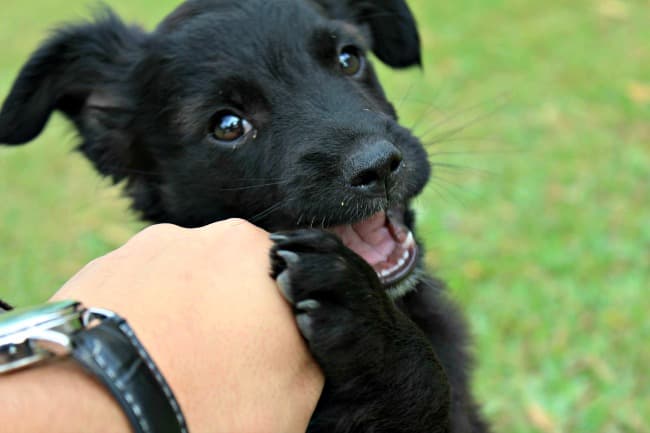
Making sure he has plenty of sturdy teething toys is the first step to dealing with this, but it's also important to be very consistent about discouraging him from chewing or biting on things that he shouldn't... and then re-directing his attention back to his own belongings.
All puppies nip, bite and chew, it's a normal puppy behavior.
It seems to escalate during the teething stage, eventually slowing down and eventually disappearing as the pup becomes an adult dog - but there's a big 'IF' here, and that is.....
IF YOU WORK ON SHOWING YOUR PUPPY THAT NIPPING/BITING PEOPLE, AND CHEWING ON FURNITURE, CLOTHES ETC. IS NOT ACCEPTABLE!
Adolescent pups and adult dogs naturally bite, nip and chew less than puppies do, but unless they've been clearly shown that it's not okay to do these things, they will still do them - whenever they feel like it.
When it comes to the nipping and biting it can be serious, because this behavior can develop to become a way of expressing dominance, and an untrained dog will use it as a way to control people, or other dogs.
This can eventually lead to a dog who is bossy, unmanageable and even dangerous.
It's very important to make it clear to your puppy that biting and nipping is not something that's going to be tolerated.
Because it's a natural and instinctive habit, nipping can be difficult to break especially in some very 'mouthy' breeds.
But there ARE very effective methods and techniques that you can use to stop puppy biting, and I'd strongly recommend checking them out.
Chewing is another thing that all puppies do, although admittedly some are more vigorous, and stubborn, about it than others.
Although this won't lead to you having a pup who is dominant or at risk of biting someone, it WILL cause considerable destruction to your home if you don't deal with it early on.
Regular consistent corrections will work wonders, but you will need to be patient.
Products such as Grannick's Bitter Apple Spray can also be a BIG help.
you might also like...
- Home
- Puppy Care 101
- Puppy Teething Help
FTC Disclosure: Some pages on this site contain affiliate links. I may earn on qualified purchases.
